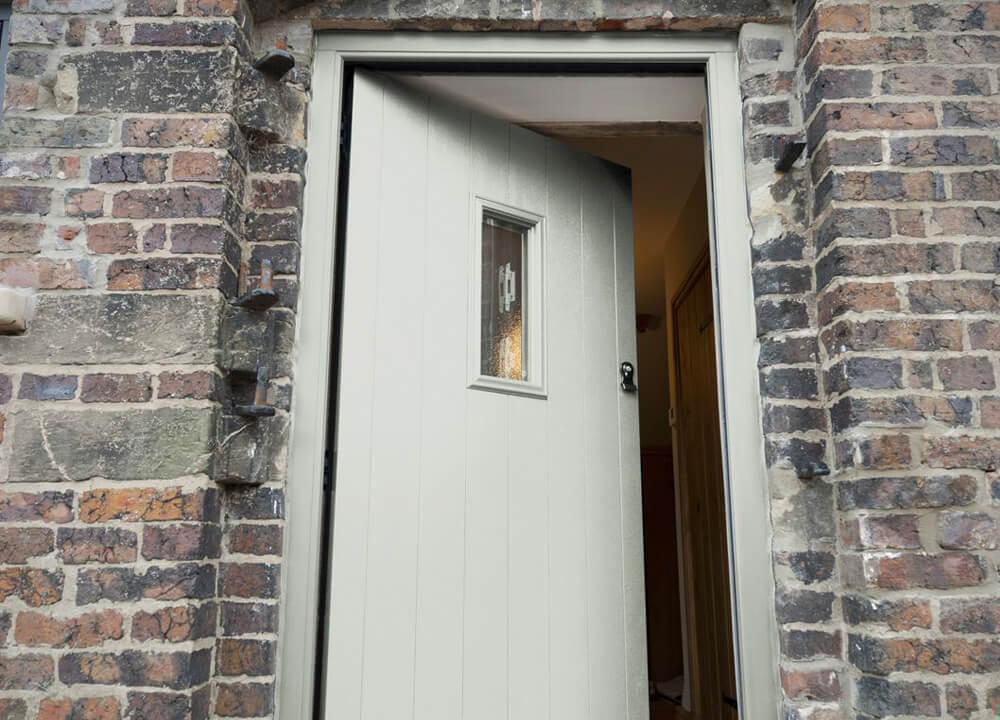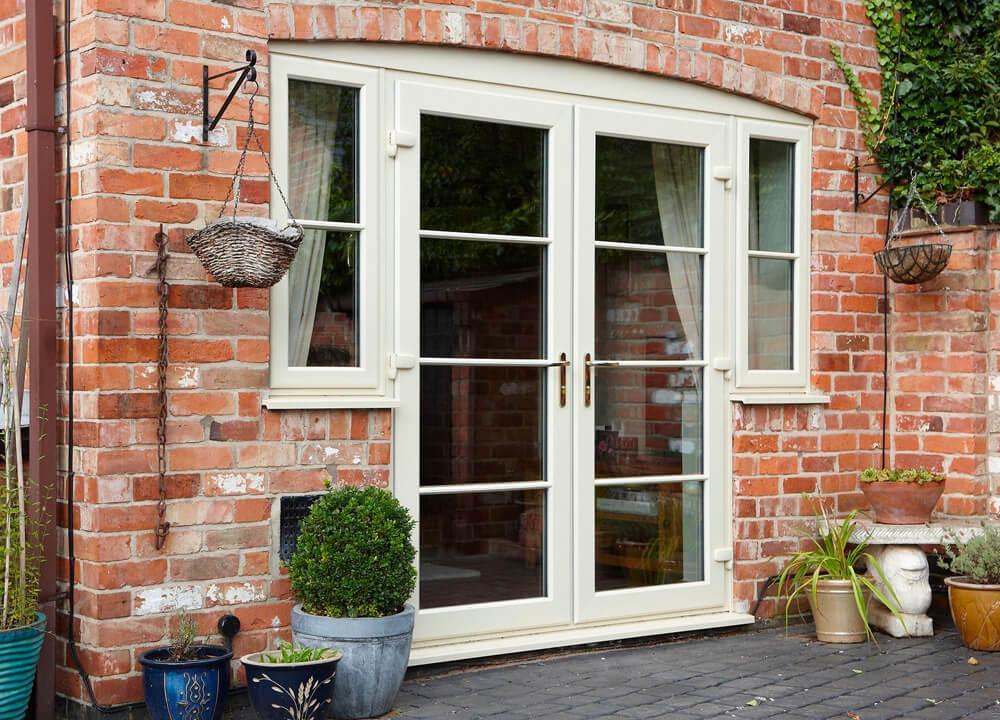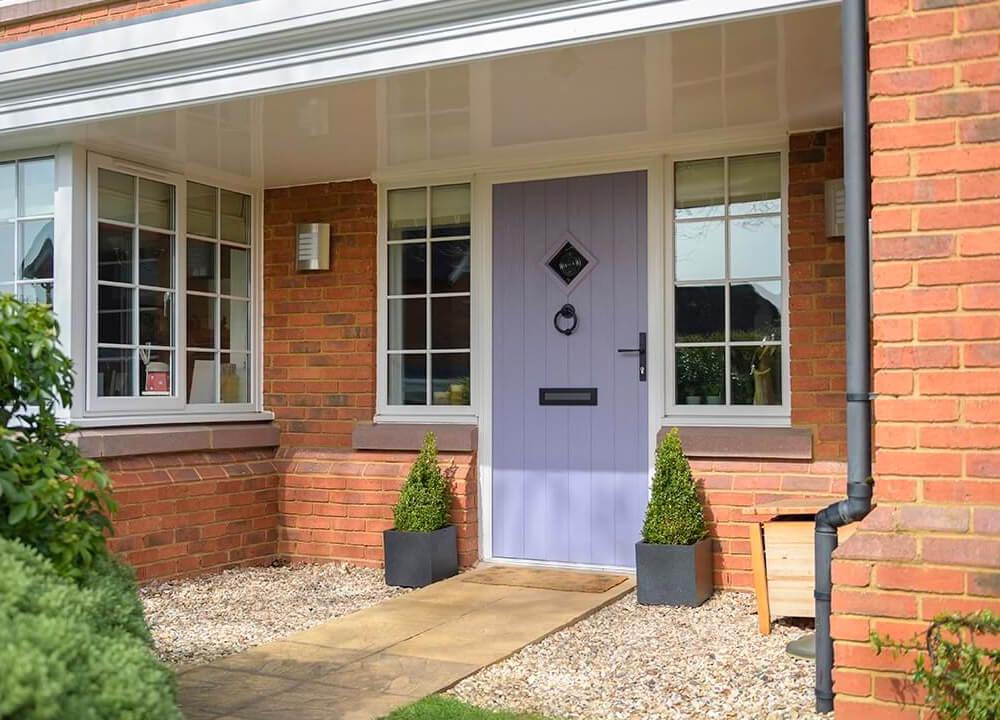When it comes to choosing a new front door for your home, two popular options are composite doors and uPVC doors. Both have unique features and benefits, but which is the right choice for your home?
This comprehensive guide will compare composite doors against uPVC doors to help you make an informed decision.

Understanding Composite Doors
What is a Composite Door?
A composite door is made from a combination of materials, typically including a solid timber core, insulating foam, and a durable GRP (Glass Reinforced Plastic) skin. This unique construction offers several advantages:
-
- Strength and durability: The solid timber core and GRP skin make composite doors incredibly strong and resistant to damage.
- Thermal efficiency: The insulating foam core and the thick construction help to trap heat. This could lead to a reduction in your energy bills.
- Low maintenance: Unlike timber doors, composite doors don’t require regular painting or staining, and they don’t warp or rot.
- Security: The robust construction, thickness, and added security features make composite doors highly secure against intruders.
Understanding uPVC Doors
What is a uPVC Door?
uPVC (unplasticised polyvinyl chloride) doors have been popular in the UK since the 1980s. They are made from a rigid plastic material that offers several benefits:
-
- Affordability: uPVC doors are often cheaper than composite doors, making them a popular choice for many UK homeowners.
- Durable and low maintenance: Like composite doors, uPVC doors require minimal upkeep. uPVC doors are resistant to rotting, warping, and fading, ensuring they maintain their appearance.
- Energy efficiency: uPVC doors offer excellent insulation properties, helping to keep your home warm in winter and cool in summer, potentially reducing your energy bills.
- Variety of styles: uPVC doors are available in various styles and colours to suit modern and traditional homes.

Comparing Composite Doors vs uPVC Doors
Thermal Efficiency
When it comes to energy efficiency, composite doors have the edge. Their mixture of materials, insulated core and overall construction provides superior thermal performance compared to uPVC doors. This can lead to lower energy bills in the long run, making composite doors a more energy-efficient choice for your home. Despite this, uPVC doors are not inefficient and can provide good thermal performance. At Northwich Glass, our doors are available with high quality double glazing to improve their thermal efficiency even further.
Security
All our doors are rigorously tested to ensure they meet high security standards, and both composite and uPVC doors can be fitted with high-security locking systems. However, the solid core of composite doors gives them an advantage in terms of overall strength and robustness.
Aesthetics and Style Options
Both door types can be finished in various colours and woodgrain effects. Whether you want a traditional look or a more contemporary finish, there’s sure to be the perfect colour option to match your home and your personal taste. Composite doors from Northwich Glass are highly effective at mimicking the look of traditional timber doors, making them a popular choice for period properties.
Durability and Lifespan
While both door types are durable, composite doors generally have a longer lifespan. The combination of materials used in composite doors makes them more resistant to extreme weather conditions and general wear and tear. uPVC doors are still long-lasting but may not quite match the longevity of a high-quality composite door.
Cost
uPVC doors typically have a lower initial cost than composite doors. However, it’s important to consider the long-term value. The superior thermal efficiency and longer lifespan of composite doors may offset the higher upfront cost.
Making Your Decision: Composite Door vs uPVC
Choosing between a composite door and a uPVC door ultimately depends on your specific needs, budget, and the style of your home. Here are some key factors to consider:
-
- Budget: If initial cost is your primary concern, uPVC doors may be the better choice. However, composite doors may be worth the extra cost because their increased thermal performance could reduce your energy bills.
- Energy efficiency: Composite doors are the top choice for maximum thermal efficiency and potential energy bill savings, but it’s important to remember that uPVC doors are not inefficient and can provide good thermal performance.
- Security: Composite doors offer superior strength and robustness. However, given our rigorous testing and additional security offerings, both doors can provide you with safety and peace of mind.
- Aesthetics: Composite doors are a good option if you’re looking for a door that closely resembles timber, especially for a period property. Both doors are available in a wide range of colours, finishes, and glazing styles.
- Longevity: For a door that will last for many years with minimal maintenance, composite doors have the edge. Composite doors tend to outlast uPVC doors by around 10 to 15 years on average.
- Property value: High-quality composite doors can add more value to your property than uPVC doors, given their strength and higher costs. They also add additional kerb appeal.

Door Choices from Northwich Glass
Both composite and uPVC doors offer significant advantages over traditional timber doors in terms of maintenance, durability, and energy efficiency. While uPVC doors provide a cost-effective solution with good performance, composite doors edge ahead regarding thermal efficiency, security, and longevity.
Northwich Glass offers a wide range of composite and uPVC doors to suit every home and budget. Our friendly sales team is always available to provide expert advice and help you choose the perfect new door for your property. Whether you opt for a composite door or a uPVC door, you can be assured of high-quality products and professional installation from our experienced team.
Remember, the best door for your home will depend on your specific requirements and preferences. We encourage you to visit our showroom to see our range of doors in person and discuss your options with our knowledgeable staff.
Contact Us
Our team is ready to answer your questions, provide quotes, or schedule appointments.
You can phone us on 01606 810 000, email us at reception@northwichglass.co.uk or use our online contact form.
We look forward to hearing from you!

